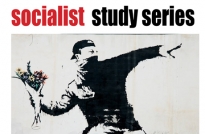News
You are here
February 14: Women’s Memorial March

February 5, 2014
Since it was initiated in 1991 by women in Vancouver’s Downtown Eastside, Coast Salish Territories, the Women’s Memorial March has gathered every February 14 to honour missing and murdered women. This year there are memorial marches in Victoria, Vancouver, Calgary, Edmonton, Thunder Bay, London, Owen Sound, Toronto, and Montreal.
As Marlene George, Memorial March Committee organizer explains, “We are here to honour and remember the women, and we are here because we are failing to protect women from poverty and systemic exploitation, abuse and violence. We are here in sorrow and in anger because the violence continues each and every day and the list of missing and murdered women gets longer every year.” This includes high profile cases—like the Pickton murders, 18 of which occurred after the police and courts released him for attempted murder of a sex worker—and anonymous cases.
Violence against indigenous women
Violence against women disproportionately affects indigenous women, tied to the colonial assault on indigenous communities and their land. As Melina Laboucan-Massimo, climate justice activist and member of the Lubicon Cree First Nation, said at last year’s Powershift conference, “violence against the earth begets violence against women.”
The Native Women’s Association of Canada has documented over 582 cases of missing and murdered Aboriginal women and girls. According to the United Nations Committee on the Elimination of Discrimination against Women, “hundreds of cases involving aboriginal women who have gone missing or been murdered in the past two decades have neither been fully investigated nor attracted priority attention.”
Harper’s drive to develop the tar sands and destroy environmental protection goes hand in hand with his denial of Canada’s history of colonialism and complicity with violence against indigenous women. In 2007 Harper made Canada one of only four countries to vote against the UN Declaration on the Rights of Indigenous Peoples, and in 2010 he cut funding to the Sisters in Spirit database—run by the NWAC—and instead handed over database funding to the RCMP. According to indigenous activist Ellen Gabriel, former President of the Quebec Native Women’s Association, “The RCMP are the ones, the culprits, who have, through their apathy, done nothing to improve this situation.”
The day before last’s years march, Human Rights Watch released a report detailing police failures to protect indigenous women from violence and police violence towards indigenous women. Ten days after the report, an indigenous girl in Edmonton went to police bruised and bloody from a rape, and the police arrested her instead. Since last year’s march, three more indigenous women have been killed in Toronto.
But indigenous women’s resistance is shining a light on this colonial violence, and inspiring people to challenge the system that produces it. In Toronto, No More Silence—which is creating a community-run database documenting violent deaths of Indigenous women/Two-spirit and Trans in Ontario—has been holding ceremony at police headquarters. This year the ceremony begins at 12:30 Police Headquarters 40 College Street at Bay, Toronto
For other memorial march listings, visit here
Sign and circulate the NWAC petition calling for a national inquiry.
Section:










